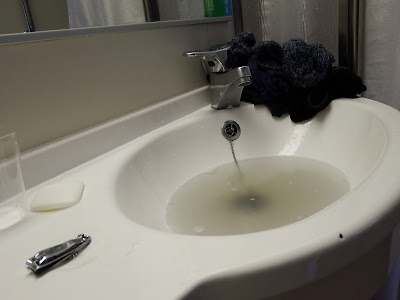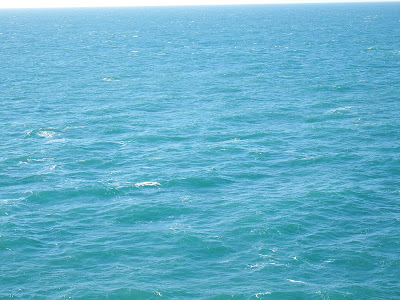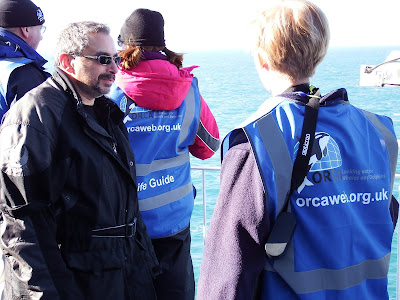Terra Firma Date 21/03/2016
Safely ensconced aboard the boat, with our bikes vigorously strapped down by a spotty young deck hand enthused with the over zealousness of youth, we settled into our executive outside 4-berth cabin (the only one available with our last moment booking change) to find we would not have to pay the outlandish €4/ hour to connect to the internet as the cabin came with free atrocious Wi-Fi, we are determined to recoup as much of the excessive change-of-booking fee we incurred. Totally exhausted, I collapsed on the bunk with what I noticed was the latest in prison mattress fashion, while Cameron read the entertainment timetable for the journey and we settled on a talk from the whale watchers charity Orcaweb.org.uk at 3pm the following day. With that, I had just enough energy to pull of my boots, Kevlar jeans and recently acquired second-hand Belstaff Courdura jacket—the only style available for less than £150—and fell fast asleep.
I was up early the next morning, not revived to the fresh flood of youth by my sleep. No, I had been disturbed by my discs over enthusiastic spooning with my spinal column, and my legs now twitched and writhing with cramps. I tried to rise quietly at the unearthly hour of 6:30am without disturbing my son. Kneading the gnarled, knotted muscles, trying to straighten my legs, which eventually paid dividends. With excellent washing facilities en-suite, I turned the shower room into a Chinese laundry, and was surprised by the colour of the water and put it down to leaching colour from new socks as it is not possible we could be so dirty at this stage of our journey.
Time idled away as we were still in the English channel following a nights uncomfortable sailing and then for several hours we were docked at Roscoff for a crew change as I noticed our enthusiastic deck hand depart with a heavily laden case, no doubt illegal contraband of Adele work-out DVD’s though Cameron was of the opinion it was his work-out bench given the way he strapped our bikes down, Gallicly ignoring our protestations. We ate and waited for the highlight of the entertainment schedule: the whale presentation and whale watching, which should be at its best shortly after leaving Roscoff and entering the Bay of Biscay. I was pleased to start this journey with such an interesting environmental story and other regular travellers had availed us of stories of schools of dolphin playing with the bow waves so we were quite looking forward to it.
At 3pm, we sat with a shaven-headed English chap on his way back home to Spain for the talk. I said hello and asked him if he was here to listen to the talk on whales, and he answered with a swarthy tone of indignation, “Apparently so,” then promptly got up to go outside and smoke the roll up he had just finished—no doubt to look for dolphins, I thought. The presentation on whale watching commenced with an introduction to orcaweb.org.uk and an explanation as to how they used the ferries during the summer to monitor the whales and dolphins, which they had been doing for nearly 20 years. On this trip, the whole team was assembled since it was the beginning of the season and they were training, and I thought it interesting to note that all but one were female. As a presentation moved into multicoloured graphics about their preferred feeding locations, I must candidly say the mental exhaustion, lack of sleep and the reminiscences of afternoon college lectures cause me to fall into a deep sleep.
I was woken by my son at the end of the presentation in time for the opportunity to go on decks and view the promised shoals of frolicking dolphins alongside the boat. Our initial experience was a little sobering as we cast our eyes across the miles of open and empty ocean and with the total absence of any form of marine life after half an hour one wave looked like another and it became difficult to tell them apart.
At this point, I got into a conversation with Yolanda, a young Orcaweb volunteer who, freshly out of college, had landed this wonderful opportunity to engage with the wildlife of our planet. This was her very first trip, with the exception of a weeks training with the ships entertainment team, which had started at the dockside alongside television crews reporting on the cancellation of some sailings due to the force 11 gales. The Orcaweb volunteers, however, are made of stern stuff so with sick bags in hand she commenced training with the entertainment team and my imagination went overboard about the type of entertainment that would be laid on in a force 11 gale. It would certainly be activities requiring only the use of one hand leaving the other armed for the fast action use of a sick bag, which would no doubt come with a hefty price unless you booked a premium cabin as we had done. I was snapped out of this daydream by a sudden Tiggeresque squeak from the young girl, “Dolphins, I see dolphins!” I fumbled down for my camera clumsily finding the on switch and removing the lens cap swinging round into action I got a wonderful shot of—the waves. “They’ve gone, that was quick” commented another Orcaweb volunteer. They’re telling me, I thought as I examined the picture of waves, the very same waves I recognised from earlier on.
With my earlier siesta and the bracing sea air doing its trick, I thought it would be a good opportunity to again try and learn something of the environment and got into a conversation with Lucy who was one of the veteran whale watchers. What she said was both fascinating and disturbing, explaining how they plough these ferry routes from March to September as the Bay of Biscay provides the line between the deep chasms of the Atlantic Ocean and the shallow continental shelf. It is here that the phytoplankton bloom develops at certain times of the year, creating the feeding ground for fish and following their numbers, dolphins, sharks and whales. On the north coast of Spain, a deep canyon is the breeding ground for giant squid growing up to 40 feet in length, which are the staple diet of Beaked whales. Although just mammals like ourselves, these whales have been recorded to dive 3000m and hold their breath for over 2 ¼ hours. I then asked about the impact on these fellow mammals by mankind and wasn’t surprised to learn how overfishing of sand eels is causing breeding problems for puffin’s and harbour porpoises, or that extensive fishing of Anchovies, which are used for food on fish farms that produce less fish than the Anchovies used to feed them in the first place. There is a downloadable Good Fish Guide, not related to cooking but produced by the Marine Conservation Society to guide us towards the most sustainable fish we can eat. The construction of offshore wind farms could, however, be more hopeful for although during the construction the acoustic impact of loud pile drivers interferes with the communication and hunting methods of dolphins and porpoises, once complete these concrete structures provide ideal environment for the schooling fish. Since fishing is also banned in these areas, early research appears to indicate they provide an opportunity for these mammals to flourish.
The most disturbing aspect was moreover the effects of humankind’s pollution. Primarily this comes from discarded plastic in the sea, in the rivers and now apparently down our sinks. Plastics are consumed by the smallest sea creatures and the level of toxicity increases as it goes up the food chain. It is a fact that the Killer Whale population of Scotland has not bred for 20 years, and it is believed they will never breed again. An autopsy on a female Killer Whale washed up on the beach showed the toxins, chemicals and PCBs in her blubber were to such a high level that it had made her infertile. A population of whales off the coast of Canada very rarely have a surviving firstborn calf as the mother will offload the high levels of these toxins stored in her blubber through her milk. Now this had me thinking as I look down at my rotund midriff, these are only mammals who are eating fish and so what is the difference between them and us. Is it the same case for us at the top of the fish food chain that it is impacting on our fertility and our health and I wonder what research has been done into this.
It is frustrating that the solution is so simple: it only requires us not to use unnecessary levels of plastic such as single-use items like plastic knives and forks and to ensure as much of what we do use is recycled. Of course that doesn’t stop manufacturers producing face scrubs with microbeads of plastic that simply wash down the plug hole when the use of walnut kernels on other face scrubs are just as effective. There are also all the products we use in the kitchen: it’s worth a look on the back as many of them say it will hurt the fish in your aquarium yet there is no similar concern for pouring it down the sink where it will have the same effect on your pet fish’s cousins and siblings. So thank you, Lucy, for making me reflect when I look down at my expanding waistline and the declining fertility rates of humans it makes me want to let out a big cheer for the charge on plastic bags.
Chilled to the soul and chilled to the bone, I thought it was time to return inside and get a well needed meal of fish and chips, however I now felt chips were a little easier to swallow. Not content with the amount of free Internet data I had eaten (PCB free), I decided it was time to Skype some people including my friend battling cancer. He was out collecting a prescription but it gave me an opportunity to reflect with his partner on this shocking disease. This is not the first time it has affected me as both my father-in-law and my own father passed away at the hands of this menace. This time, however, is quite different, and I recall times when someone has mentioned to me that their friend has cancer and in a superficial way you pass on your sympathy but then pass on to another subject. This time is up close and personal as I don’t believe there is anyone to whom I’m closer outside my family. We could have been brothers, and growing up were often mistaken for brothers as we were almost inseparable. Distance may have changed the frequency of our interaction but not the closeness of our relationship, and our families grew close on a regular annual caravan holidays together. So for someone who is still in full swing of life this is far more than a physical disease, it crushes who you are and wreaks havoc on people close to that person, pitching you into a helter-skelter of emotion. My pal is an incredible musician, and for the moment it has robbed him of his wonderful talent and changed the essence of who he is for the time being. You can see the security you have in a predefined lifestyle and plans for your future are suddenly stripped away, which must leave a chasm of uncertainty and insecurity. In the fabric of my friend's character is the need to protect the ones he holds most dear, his children. Even this has been stolen from him as every ounce of strength is channelled into overcoming the onslaught of this disease. I can tell you that by the end of our conversation, neither of us was dry eyed.
I am anxious about what lies ahead on this journey, but today’s events have reaffirmed that I need to travel and encapsulate what I find in my children’s adventure book.
Across The Handlebars is also available as an email newsletter. Click here to subscribe to Across The Handlebars blog posts, and only blog posts.
Across The Handlebars is also available as an email newsletter. Click here to subscribe to Across The Handlebars blog posts, and only blog posts.



No comments:
Post a Comment